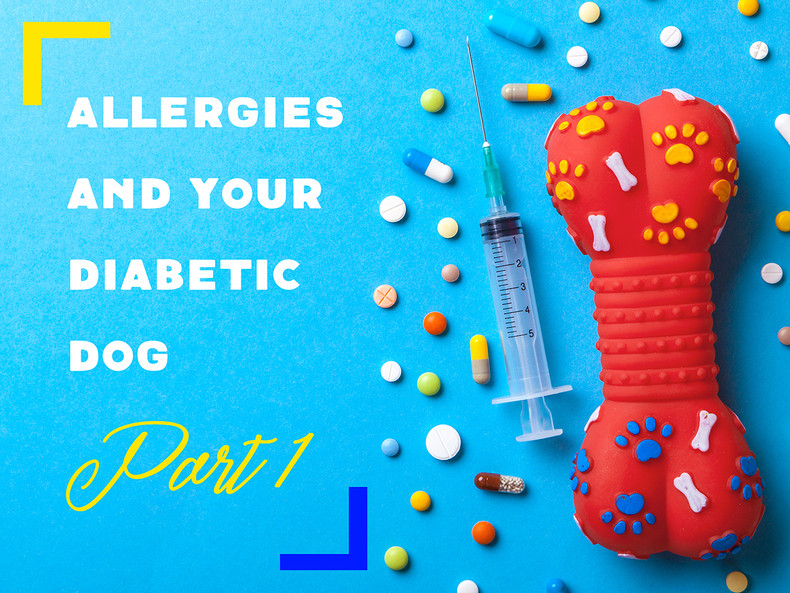Allergies and Your Diabetic Dog Part 1
Have you noticed that your pup is itchy for the first time? Are you thinking that it’s odd that your pup has never had allergies before and now seems to be suffering from them? I wondered that too. When in TX, my boys had no issues with allergies. Once diagnosed, Max started licking his feet and on occasion chewing them. Finn never had any issues. I began to think that it had something to do with the Diabetes diagnosis. So once again, it was time to start researching, “Dr. Google”, paging “Dr Google”.
I know that most vets will suggest Apoquel or Cytopoint to treat the itch, as I’ve mentioned more than once, my preference is to treat the problem instead of treating the symptoms. That is MY preference, that doesn’t mean that it is yours. While those medications may stop the itch, will they treat the root cause? I’m thinking not. If you don’t get to the root of the problem, what starts out as a seasonal allergy will progress over time and become a year round allergy, so get started as soon as you see this behavior to get to the bottom of what the cause is. Instead of masking the symptoms, let’s find the problem! There are treatments that you can do at home that will give your pup some much needed relief without shutting down their immune system through pharmaceuticals.
Being that Diabetes is an autoimmune disease, it means that the immune system is compromised. Well, just like in humans, most of the dog’s immune system is in their gut. So keeping their gut healthy is a great place to start whether they have allergies or not. How do we do that you ask? I’d start with a really good quality probiotic. There are probiotics in all price ranges, so I would do some research and buy the best one that you can afford. Some common ones are Proviable, FortiFlora; Mercola (Dr. Karen Becker) has a good one. As you look for a good probiotic, check the ingredients for any kind of sweeteners. Many chewables will have some sort of sweetener so best to avoid those unless no sweeteners are present. Try to find as many of these beneficial bacteria as you can in the one that you choose: Enterococcus faecium, Lactobacillus acidophilus, Lactobacillus casei, Lactobacillus plantarum, Bifidobacterium bifidum, Bifidobacterium animalis, VSL #3.
Now that you have found your probiotic, let’s talk about how to treat the allergies. There are only two types of allergies in pets, food and environmental. Did the itchiness come about with a change of food? If the answer is yes, then it is safe to assume that your pup may have a sensitivity to something that is in the new food. Check the packaging and see if there is a new ingredient that wasn’t in the last food that you were feeding. You will need to be a bit of a Sherlock Holmes for this one. If you haven’t changed food, you can call the company that makes your food and ask if they are sourcing their ingredients from a new supplier. If you think that its food related, you can look for another Diabetic appropriate food, buy a small bag, and see if the itch goes away. I know that in our group ( CDSI), we have lists of Diabetic appropriate foods, both dry kibble and canned options.
One way to narrow the possibilities is to home cook for your pup for a week or so with a novel protein like Bison or white fish and see if the itchiness goes away. We covered home cooking in this blog entry (click on the highlighted text). If the week of home cooking helps with the allergies, then likely the source of your pup’s discomfort is food related. Many times a food sensitivity or allergy will manifest in the same way that an environmental allergy does, so tracking all of this down is not as easy as it sounds.
You may want to have your vet check for “leaky gut syndrome”. This is a condition where the GI tract is “leaking” allergens into the bloodstream. Antibiotics and steroids as well as some other long term medications can cause leaky gut syndrome. Genetically modified (GMO) ingredients in your pup’s food can also cause leaky gut. There is a test that can be done to detect Leaky Gut Syndrome. You will need a fecal sample about the size of a grape sent to Texas A&M for analysis. Find the explanation of the test here: http://www.cvm.tamu.edu/gilab/service/assays/canine-microbiota-dysbiosis-index
I had intended to cram all of the information into one blog post, but I fear that it would become “The Great American Novel”, so I will break this into two parts. In our next entry, we will discuss how to treat the environmental allergies. There are lots of ways, so stay tuned for part 2!
You’ll notice that for most of the products, previous blog entries or groups that I mention, the text is linked to a website that you can purchase that item or a link to join the group mentioned. Just click on the colored text (red or blue, depending what device you are on) and it should take you right to the item or group. If you have any thoughts or ideas for topics that you’d like to see covered here, please feel free to comment below or send me an email at NancyForPetTest@PharmasSupply.com. As always, please “like” this blog post or any of the others that have helped you or just refreshed your memory. Look for new posts every Monday, Wednesday and Friday!
Until next time…

